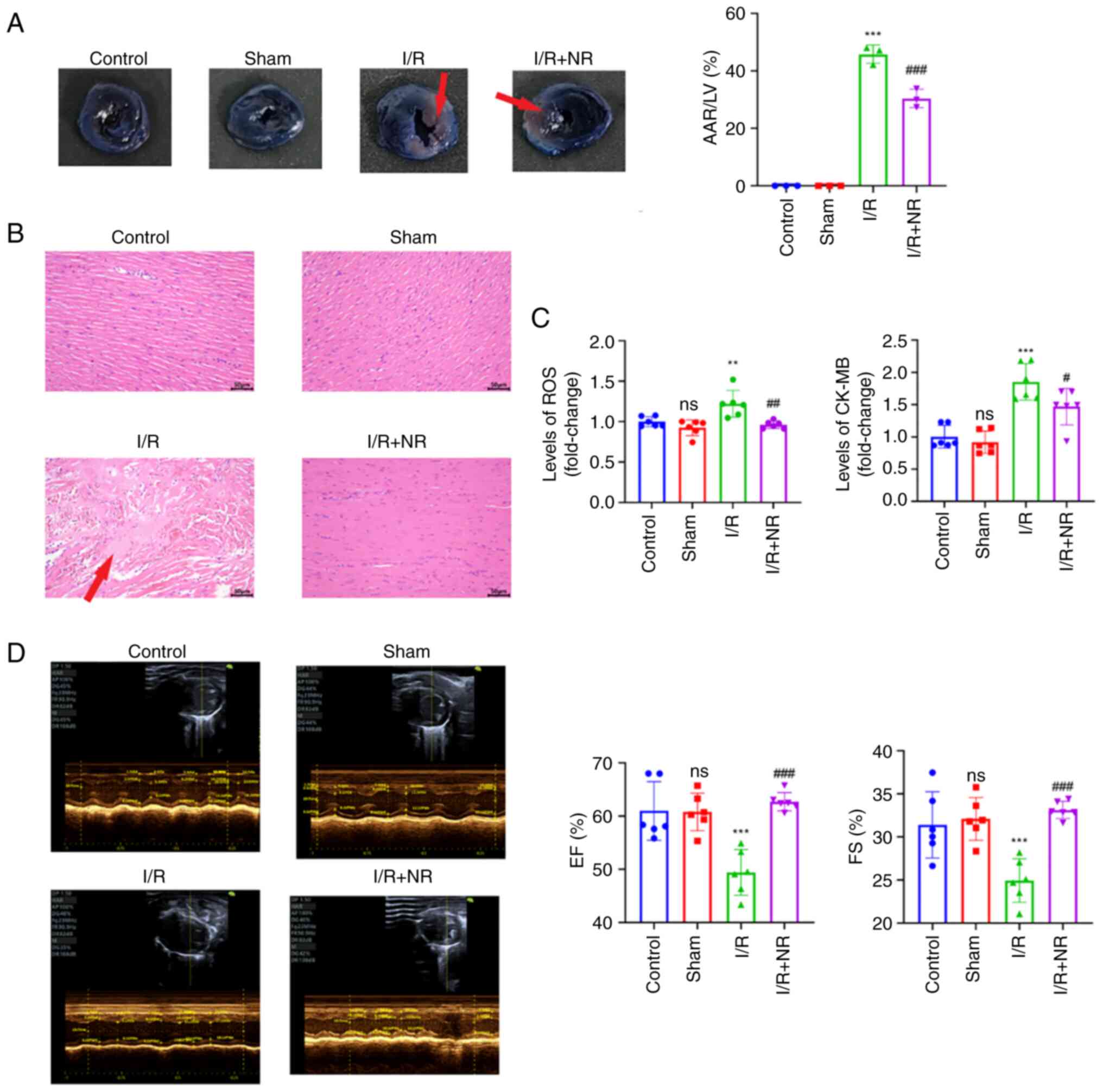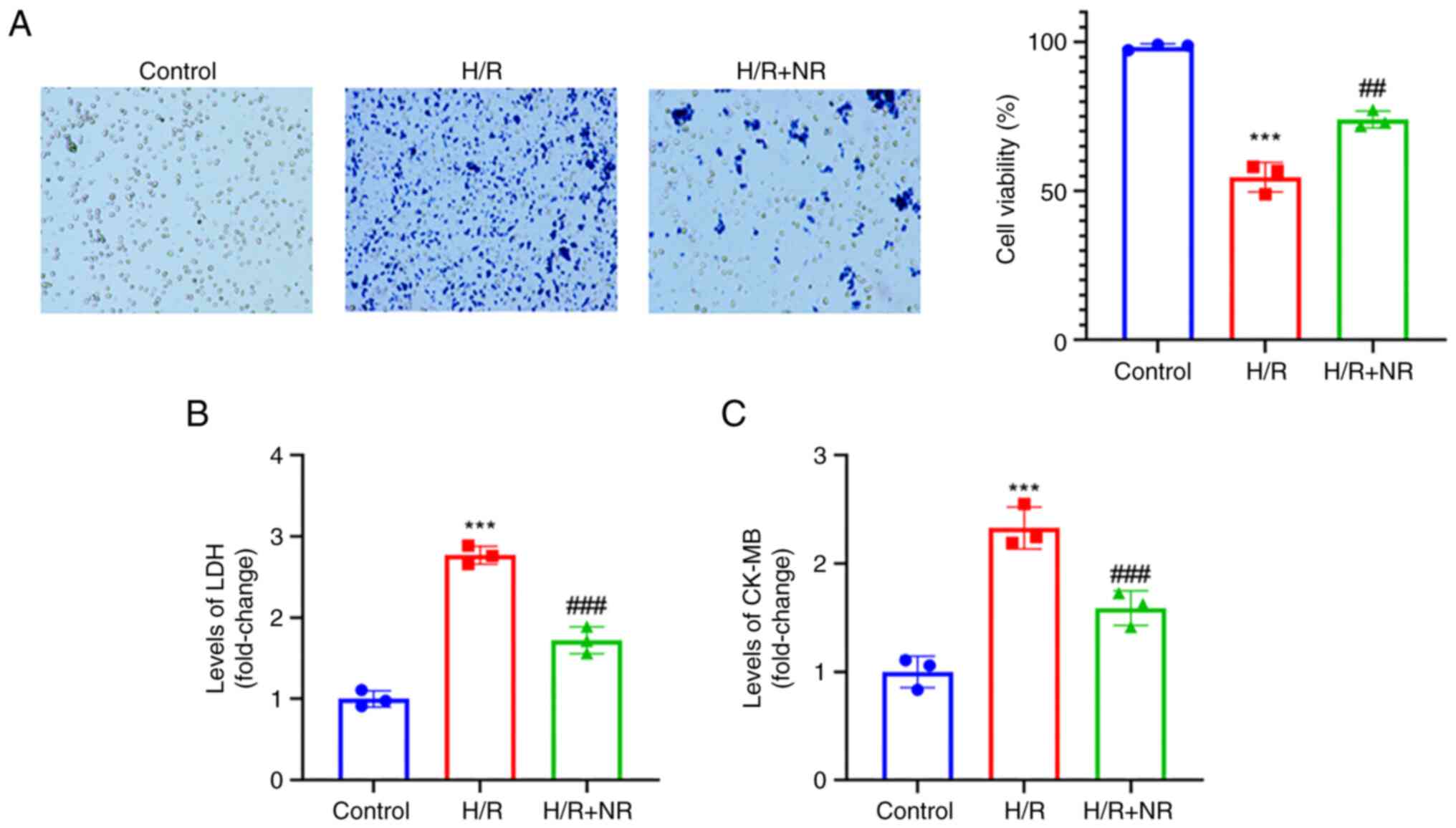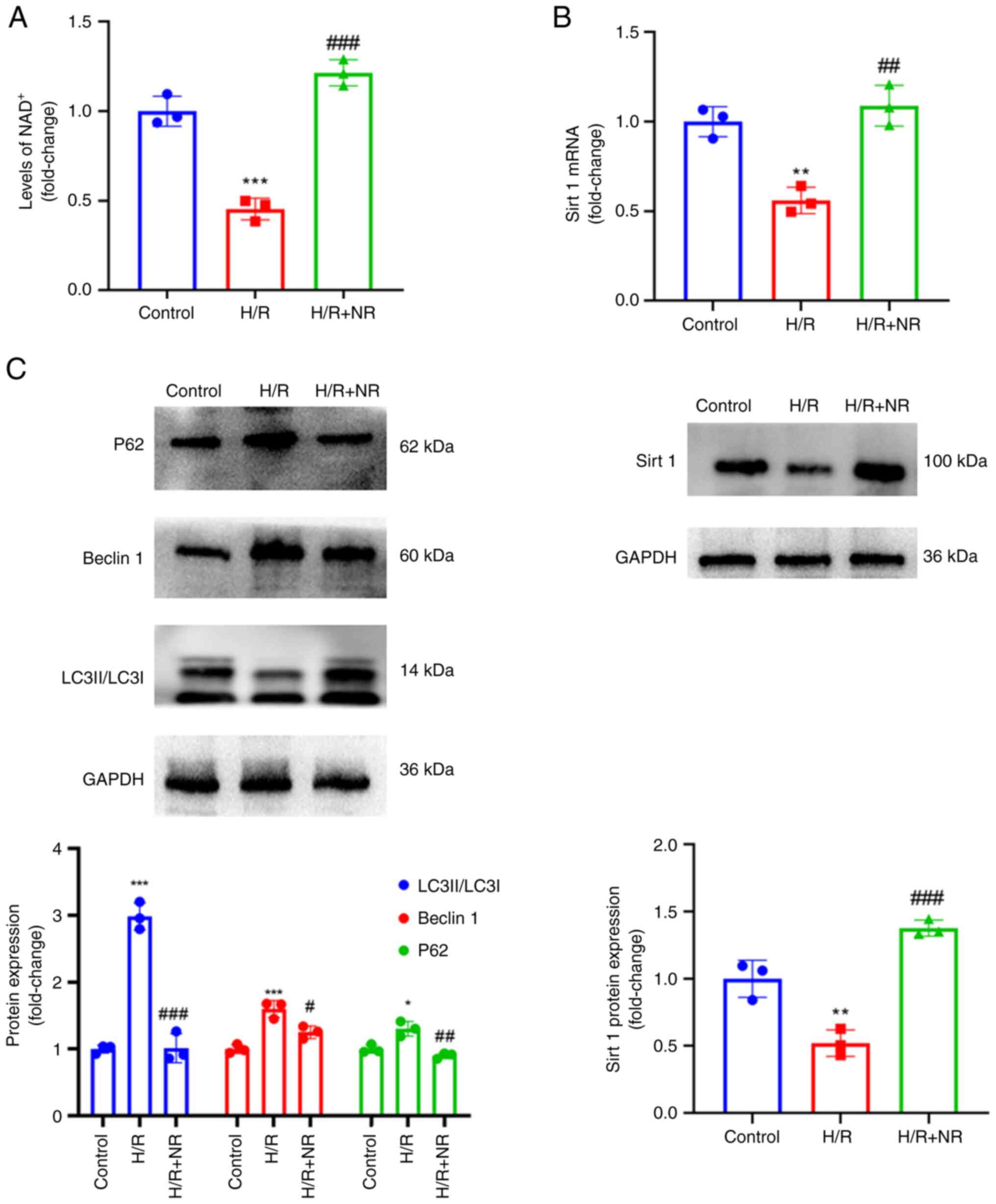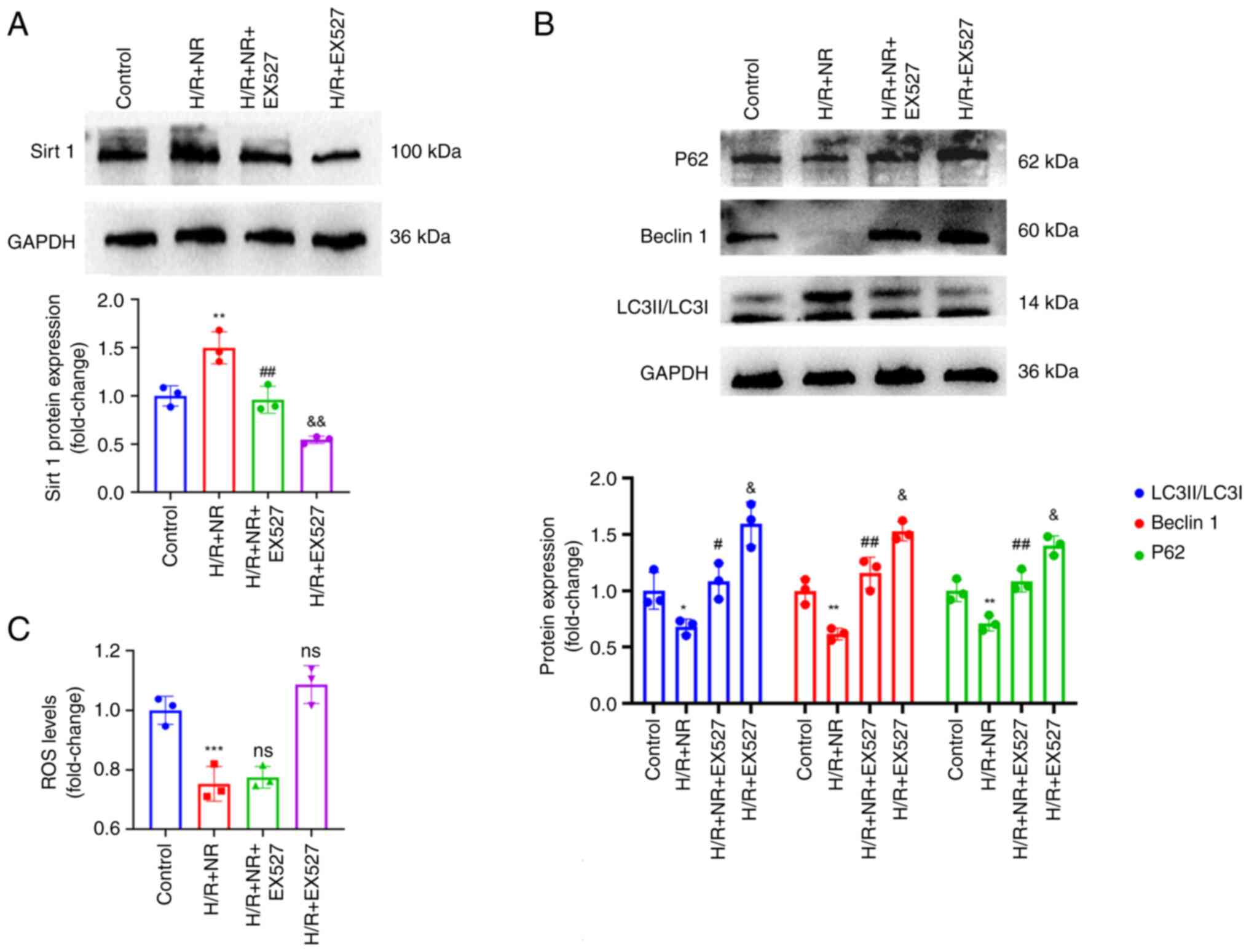|
1
|
Writing Group Members. Mozaffarian D,
Benjamin EJ, Go AS, Arnett DK, Blaha MJ, Cushman M, Das SR, de
Ferranti S, Després JP, et al: Heart disease and stroke
statistics-2016 update a report from the American heart
association. Circulation. 133:e38–e360. 2016.PubMed/NCBI View Article : Google Scholar
|
|
2
|
Buja LM: Myocardial ischemia and
reperfusion injury. Cardiovasc Pathol. 14:170–175. 2005.PubMed/NCBI View Article : Google Scholar
|
|
3
|
Mokhtari-Zaer A, Marefati N, Atkin SL,
Butler AE and Sahebkar A: The protective role of curcumin in
myocardial ischemia-reperfusion injury. J Cell Physiol.
234:214–222. 2018.PubMed/NCBI View Article : Google Scholar
|
|
4
|
Hausenloy DJ and Yellon DM: Myocardial
ischemia-reperfusion injury: A neglected therapeutic target. J Clin
Invest. 123:92–100. 2013.PubMed/NCBI View
Article : Google Scholar
|
|
5
|
Yellon DM and Baxter GF: Protecting the
ischaemic and reperfused myocardium in acute myocardial infarction:
A distant dream or near reality? Heart. 83:381–387. 2000.PubMed/NCBI View Article : Google Scholar
|
|
6
|
Goldhaber JI and Weiss JN: Oxygen free
radicals and cardiac reperfusion abnormalities. Hypertension.
20:118–127. 1992.PubMed/NCBI View Article : Google Scholar
|
|
7
|
Collard CD and Gelman S: Pathophysiology,
clinical manifestations, and prevention of ischemia-reperfusion
injury. Anesthesiology. 94:1133–1138. 2001.PubMed/NCBI View Article : Google Scholar
|
|
8
|
Burke AP and Virmani R: Pathophysiology of
acute myocardial infarction. Med Clin North Am. 91:553–572.
2007.PubMed/NCBI View Article : Google Scholar
|
|
9
|
Becker LB: New concepts in reactive oxygen
species and cardiovascular reperfusion physiology. Cardiovasc Res.
61:461–470. 2004.PubMed/NCBI View Article : Google Scholar
|
|
10
|
Martinet W, Knaapen MW, Kockx MM and De
Meyer GR: Autophagy in cardiovascular disease. Trends Mol Med.
13:482–491. 2007.PubMed/NCBI View Article : Google Scholar
|
|
11
|
Ferrari R, Balla C, Malagù M, Guardigli G,
Morciano G, Bertini M, Biscaglia S and Campo G: Reperfusion
damage-a story of success, failure, and hope. Circ J. 81:131–141.
2017.PubMed/NCBI View Article : Google Scholar
|
|
12
|
Turer AT and Hill JA: Pathogenesis of
myocardial ischemia-reperfusion injury and rationale for therapy.
Am J Cardiol. 106:360–368. 2010.PubMed/NCBI View Article : Google Scholar
|
|
13
|
Moens AL, Claeys MJ, Timmermans JP and
Vrints CJ: Myocardial ischemia/reperfusion-injury, a clinical view
on a complex pathophysiological process. Int J Cardiol.
100:179–190. 2005.PubMed/NCBI View Article : Google Scholar
|
|
14
|
Du J, Li Y and Zhao W: Autophagy and
myocardial ischemia. Adv Exp Med Biol. 1207:217–222.
2020.PubMed/NCBI View Article : Google Scholar
|
|
15
|
Yorimitsu T and Klionsky DJ: Autophagy:
Molecular machinery for self-eating. Cell Death Differ. 12 (Suppl
2):1542–1552. 2005.PubMed/NCBI View Article : Google Scholar
|
|
16
|
Hu S, Cao S, Tong Z and Liu J: FGF21
protects myocardial ischemia-reperfusion injury through reduction
of miR-145-mediated autophagy. Am J Transl Res. 10:3677–3688.
2018.PubMed/NCBI
|
|
17
|
Zhang J, Liu J, Huang Y, Chang JY, Liu L,
McKeehan WL, Martin JF and Wang F: FRS2α-mediated FGF signals
suppress premature differentiation of cardiac stem cells through
regulating autophagy activity. Circ Res. 110:e29–e39.
2012.PubMed/NCBI View Article : Google Scholar
|
|
18
|
Chambon P, Weill JD and Mandel P:
Nicotinamide mononucleotide activation of new DNA-dependent
polyadenylic acid synthesizing nuclear enzyme. Biochem Biophys Res
Commun. 11:39–43. 1963.PubMed/NCBI View Article : Google Scholar
|
|
19
|
De Flora A, Zocchi E, Guida L, Franco L
and Bruzzone S: Autocrine and paracrine calcium signaling by the
CD38/NAD+/cyclic ADP-ribose system. Ann N Y Acad Sci. 1028:176–191.
2004.PubMed/NCBI View Article : Google Scholar
|
|
20
|
Imai S, Armstrong CM, Kaeberlein M and
Guarente L: Transcriptional silencing and longevity protein Sir2 is
an NAD+-dependent histone deacetylase. Nature. 403:795–800.
2000.PubMed/NCBI View
Article : Google Scholar
|
|
21
|
Mehmel M, Jovanović N and Spitz U:
Nicotinamide riboside-the current state of research and therapeutic
uses. Nutrients. 12(1616)2020.PubMed/NCBI View Article : Google Scholar
|
|
22
|
Luo G, Jian Z, Zhu Y, Zhu Y, Chen B, Ma R,
Tang F and Xiao Y: Sirt1 promotes autophagy and inhibits apoptosis
to protect cardiomyocytes from hypoxic stress. Int J Mol Med.
43:2033–2043. 2019.PubMed/NCBI View Article : Google Scholar
|
|
23
|
Zhang H, Ryu D, Wu Y, Gariani K, Wang X,
Luan P, D'Amico D, Ropelle ER, Lutolf MP, Aebersold R, et al:
NAD+ repletion improves mitochondrial and stem cell
function and enhances life span in mice. Science. 352:1436–1443.
2016.PubMed/NCBI View Article : Google Scholar
|
|
24
|
Lin JH, Yang KT, Ting PC, Luo YP, Lin DJ,
Wang YS and Chang JC: Gossypol acetic acid attenuates cardiac
ischemia/reperfusion injury in rats via an antiferroptotic
mechanism. Biomolecules. 11(1667)2021.PubMed/NCBI View Article : Google Scholar
|
|
25
|
Hou Y, Wei Y, Lautrup S, Yang B, Wang Y,
Cordonnier S, Mattson MP, Croteau DL and Bohr VA: NAD+
supplementation reduces neuroinflammation and cell senescence in a
transgenic mouse model of Alzheimer's disease via cGAS-STING. Proc
Natl Acad Sci USA. 118(e2011226118)2021.PubMed/NCBI View Article : Google Scholar
|
|
26
|
Diguet N, Trammell SAJ, Tannous C, Deloux
R, Piquereau J, Mougenot N, Gouge A, Gressette M, Manoury B, Blanc
J, et al: Nicotinamide riboside preserves cardiac function in a
mouse model of dilated cardiomyopathy. Circulation. 137:2256–2273.
2018.PubMed/NCBI View Article : Google Scholar
|
|
27
|
Sun L, Wang H, Xu D, Yu S, Zhang L and Li
X: Lapatinib induces mitochondrial dysfunction to enhance oxidative
stress and ferroptosis in doxorubicin-induced cardiomyocytes via
inhibition of PI3K/AKT signaling pathway. Bioengineered. 13:48–60.
2022.PubMed/NCBI View Article : Google Scholar
|
|
28
|
Lu ZY, Liu ZY and Fang B: Propofol
protects cardiomyocytes from doxorubicin-induced toxic injury by
activating the nuclear factor erythroid 2-related factor
2/glutathione peroxidase 4 signaling pathways. Bioengineered.
13:9145–9155. 2021.PubMed/NCBI View Article : Google Scholar
|
|
29
|
Donato AJ, Walker AE, Magerko KA, Bramwell
RC, Black AD, Henson GD, Lawson BR, Lesniewski LA and Seals DR:
Life-long caloric restriction reduces oxidative stress and
preserves nitric oxide bioavailability and function in arteries of
old mice. Aging Cell. 12:772–783. 2013.PubMed/NCBI View Article : Google Scholar
|
|
30
|
Donato AJ, Magerko KA, Lawson BR, Durrant
JR, Lesniewski LA and Seals DR: SIRT-1 and vascular endothelial
dysfunction with ageing in mice and humans. J Physiol.
589:4545–4554. 2011.PubMed/NCBI View Article : Google Scholar
|
|
31
|
Ding S, Liu D, Wang L, Wang G and Zhu Y:
Inhibiting microRNA-29a protects myocardial ischemia-reperfusion
injury by targeting SIRT1 and suppressing oxidative stress and
NLRP3-mediated pyroptosis pathway. J Pharmacol Exp Ther.
372:128–135. 2020.PubMed/NCBI View Article : Google Scholar
|
|
32
|
Xiao Y, Phelp P, Wang Q, Bakker D,
Nederlof R, Hollmann MW and Zuurbier CJ: Cardioprotecive properties
of known agents in rat ischemia-reperfusion model under clinically
relevant conditions: Only the NAD precursor nicotinamide riboside
reduces infarct size in presence of fentanyl, midazolam and
cangrelor, but not propofol. Front Cardiovasc Med.
8(712478)2021.PubMed/NCBI View Article : Google Scholar
|
|
33
|
Bogan KL and Brenner C: Nicotinic acid,
nicotinamide, and nicotinamide riboside: A molecular evaluation of
NAD+ precursor vitamins in human nutrition. Annu Rev Nutr.
28:115–130. 2008.PubMed/NCBI View Article : Google Scholar
|
|
34
|
Trammell SA, Weidemann BJ, Chadda A, Yorek
MS, Holmes A, Coppey LJ, Obrosov A, Kardon RH, Yorek MA and Brenner
C: Nicotinamide riboside opposes type 2 diabetes and neuropathy in
mice. Sci Rep. 6(26933)2016.PubMed/NCBI View Article : Google Scholar
|
|
35
|
Houstis N, Rosen ED and Lander ES:
Reactive oxygen species have a causal role in multiple forms of
insulin resistance. Nature. 440:944–948. 2006.PubMed/NCBI View Article : Google Scholar
|
|
36
|
Xu C, Wang L, Fozouni P, Evjen G, Chandra
V, Jiang J, Lu C, Nicastri M, Bretz C, Winkler JD, et al: SIRT1 is
downregulated by autophagy in senescence and ageing. Nat Cell Biol.
22:1170–1179. 2020.PubMed/NCBI View Article : Google Scholar
|
|
37
|
Yang M, Xi N, Gao M and Yu Y: Sitagliptin
mitigates hypoxia/reoxygenation (H/R)-induced injury in
cardiomyocytes by mediating sirtuin 3 (SIRT3) and autophagy.
Bioengineered. 13:13162–13173. 2022.PubMed/NCBI View Article : Google Scholar
|
|
38
|
Liu CY, Zhang YH, Li RB, Zhou LY, An T,
Zhang RC, Zhai M, Huang Y, Yan KW, Dong YH, et al: LncRNA CAIF
inhibits autophagy and attenuates myocardial infarction by blocking
p53-mediated myocardin transcription. Nat Commun.
9(29)2018.PubMed/NCBI View Article : Google Scholar
|
|
39
|
Gao C, Wang R, Li B, Guo Y, Yin T, Xia Y,
Zhang F, Lian K, Liu Y, Wang H, et al: TXNIP/Redd1 signalling and
excessive autophagy: A novel mechanism of myocardial
ischaemia/reperfusion injury in mice. Cardiovasc Res. 116:645–657.
2020.PubMed/NCBI View Article : Google Scholar
|
|
40
|
Marek-Iannucci S, Thomas A, Hou J, Crupi
A, Sin J, Taylor DJ, Czer LS, Esmailian F, Mentzer RM Jr, Andres AM
and Gottlieb RA: Myocardial hypothermia increases autophagic flux,
mitochondrial mass and myocardial function after
ischemia-reperfusion injury. Sci Rep. 9(10001)2019.PubMed/NCBI View Article : Google Scholar
|
|
41
|
Eltzschig HK and Eckle T: Ischemia and
reperfusion-from mechanism to translation. Nat Med. 17:4349–4360.
2011.PubMed/NCBI View Article : Google Scholar
|
|
42
|
Chouchani ET, Pell VR, Gaude E,
Aksentijević D, Sundier SY, Robb EL, Logan A, Nadtochiy SM, Ord
ENJ, Smith AC, et al: Ischaemic accumulation of succinate controls
reperfusion injury through mitochondrial ROS. Nature. 515:431–435.
2014.PubMed/NCBI View Article : Google Scholar
|
|
43
|
Cadenas S: ROS and redox signaling in
myocardial ischemia-reperfusion injury and cardioprotection. Free
Radic Biol Med. 117:76–89. 2018.PubMed/NCBI View Article : Google Scholar
|
|
44
|
Jin Q, Jiang Y, Fu L, Zheng Y, Ding Y and
Liu Q: Wenxin granule ameliorates hypoxia/reoxygenation-induced
oxidative stress in mitochondria via the PKC-δ/NOX2/ROS
pathway in H9c2 cells. Oxid Med Cell Longev.
2020(3245483)2020.PubMed/NCBI View Article : Google Scholar
|
|
45
|
Sinning C, Westermann D and Clemmensen P:
Oxidative stress in ischemia and reperfusion: Current concepts,
novel ideas and future perspectives. Biomark Med. 11:11031–1040.
2017.PubMed/NCBI View Article : Google Scholar
|




















